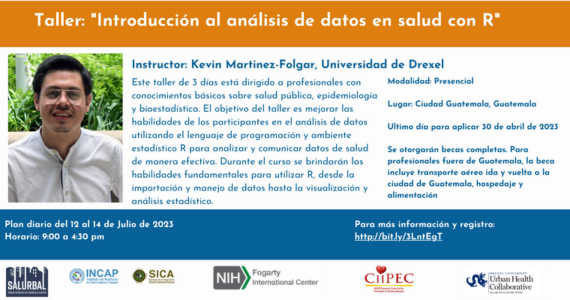Social Determinants of Cardiovascular Disease Over the Life Course
Drexel-INCAP Training Program
A joint initiative of the Drexel Urban Health Collaborative and the Institute for Nutrition of Central America and Panama (INCAP), this program focuses on developing the research capabilities of trainees and local capacity building in policy-relevant research on the influence of social determinants and place-based factors on CVD risk across the lifespan.
The Drexel-INCAP training program was awarded a 5-year grant from the National Institutes of Health and the Fogarty International Center.
Webinars, journal clubs, and workshops focus on social determinants of health, CVD and lifecourse epidemiology, and research methods.
For more information on the initiative click here
The following events were held in Spanish
Annual Workshops
The Drexel-INCAP program sponsors annual workshops focused on quantitative research designs and methods. The workshops aim to increase the quantitative capabilities of public health professionals and researchers, and illustrate how those skills are used in research.
The 2022 workshop focused on concepts, approaches and applications of regression modeling in public health, while the 2023 workshop focused on statistical programming in the software R.
Introducción al análisis de datos en salud con R (2023)
Introduction to health data analysis with R

The objective of this 3-day course was to help health professionals with backgrounds in public health, epidemiology and biostatistics to improve their skills in data analysis using the free "R" software. R is a very popular programming language and statistical environment for its ability to process large amounts of data and generate high-quality visualizations, making it an essential tool for those seeking to analyze and communicate health data effectively. During the course, the fundamental skills needed to use R were provided, from data import and manipulation to basic statistical analysis and visualization.
Taller de conceptos, abordajes y aplicaciones de métodos de regresión en salud pública (2022)
Workshop on concepts, approaches and applications of regression methods in public health

This course intended for participants to understand the basic principles for the development, implementation and interpretation of statistical regressions, their application in epidemiological research and public health problems, particularly in relation to the study of non-communicable diseases in Latin America.
Monthly Seminars
The Drexel-INCAP program also hosts monthly webinars and journal club meetings on topics of cardiovascular risk factors.
Watch the entire playlist: Cardiovascular Disease Risk Research in Central America:
Below is a list of the most recent seminars with their recordings. For information on future webinars check our events page.
¿Por qué importa el contexto para la prevención de la obesidad?
Why does context matter for obesity prevention?
June 2023
Monica Mazariegos
The seminar discussed how and why contextual factors influence obesity, and therefore the importance of considering them when developing interventions to address the complex obesity epidemic.
Hipertensión en Guatemala: Un análisis cualitativo de los modelos explicativo de pacientes, proveedores de salud y actores del nivel central
Hypertension in Guatemala: A qualitative analysis of the explanatory models of patients, health providers and central level actors
May 2023
Juan Carlos Figueroa
The talk focused on a qualitative study that used A. Kleinman's explanatory model to describe how three types of health system actors understand hypertension. The differences and similarities between actors were discussed based on a description of the domains of the model.
Enfermedad cardiovascular y sus desigualdades a través del gradiente de urbanización
Cardiovascular disease and its inequalities across the urbanization gradient
April 2023
Usama Bilal
Cardiovascular disease is the first cause of death in the world. The talk examined how the disease and its risk factors behave across the urbanization gradient, and how social inequalities in its mortality and prevalence vary along this gradient.
Evaluación del concepto y la implementación de un programa para controlar la hipertensión
Evaluation of the concept and implementation of a program to control hypertension
March 2023
Meredith Fort
In this seminar, Dr. Fort presented a mixed methods analysis of a study to improve high blood pressure control within the public primary care system in Guatemala. She reviewed the application of an implementation science model—Pragmatic and Robust Implementation and Sustainability Model, PRISM—to analyze program implementation and context at different stages of the study. During the seminar, she reflected on various topics such as community participation, strengthening the health system, the equity approach, and the integrated presentation of qualitative and quantitative data.
Contaminación del aire y la enfermedad cardiovascular
Air pollution and cardiovascular disease
February 2023
Horacio Riojas
Pollutants present in the air can affect the cardiovascular system through different mechanisms that will be presented in this session. In addition, we will talk about the acute and chronic effects that derive from these exposures and their contribution to the burden of disease. Finally, we will review the benefits that we can achieve in cardiovascular health by reducing concentrations of pollutants as part of building healthy environments.
Subscribe to the LAC-Urban Health quarterly newsletter to keep up with our news, research, and events.
Contact
Brisa Sanchez, bns48@drexel.edu
Fernanda Kroker, fkroker@incap.int
The program is funded in part by NIH-Fogarty grant D43TW011971 (Sánchez/Diez-Roux, MPIs).